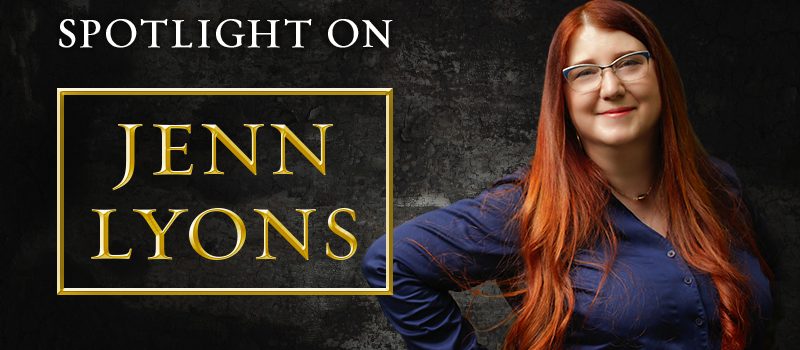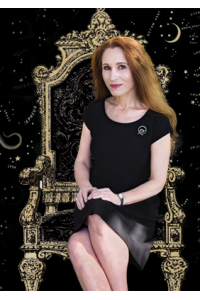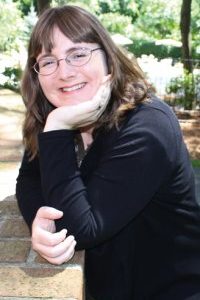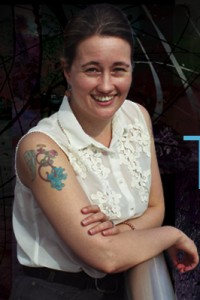Spotlight on: Jenn Lyons

The Ruin of Kings launched the Chorus of Dragons series, and book two, The Name of All Things, is out soon. Tell us about the series.
Fortunately for me, A Chorus of Dragons really IS about dragons. Also: gods, demons, prophecies, so much magic, and the poor fools caught in the middle of that whirlwind. But dig a little deeper and the series is about the way massive systems corrupt and degenerate toward authoritarianism if we don’t fight back, what people are willing to do to keep power, and the atrocities we’re willing to justify in the name of survival. Add a healthy dose of how slavery is bad, and that a system built on the back of such a foundation shouldn’t be defended, and I think you’d be pretty close to what the series is about. Not that I realized any of that when I started writing it. I just wanted to tell a fun story.
Why did you decide to switch narrators?
I originally hadn’t. Thurvishar was going to be the “editor” of book two, the same way he’d been the person pulling together the accounts in book one. But as I neared the finish of the book, I began to realize that it didn’t really make sense for him to take on that role. Whereas I had no trouble seeing Senera doing so, in part to spitefully jab at Thurvishar. Unlike Thurvishar, no one is forcing Senera to be a bad person. (Not that she thinks she’s a bad person. Just the opposite.)
Who are some of your literary influences?
I think there’s some truth to the idea that each book has a different process, but also different influences. For example, Sir Walter Scott’s Ivanhoe had a significant impact on The Name of All Things, which was as much as a surprise to me as anyone else. Likewise, Dumas’s d’Artagnan Romances influenced some characters in the overall series—Sandus, Doc, General Milligreest, and Therin map pretty directly to D’Artagnan, Athos, Porthos, and Aramis as their inspirations.
I’d also be remiss not to give shout-outs to Fred Saberhagen’s Book of Lost Swords and Robert Jordan’s Wheel of Time books. The last one being a bit of a sheepish admission, because the influence there was at least partially as a rebuttal.
What’s the attraction of writing epic fantasy instead of, say, crime novels or “literary” fiction or romance?
For me, it’s simply that I’m constitutionally incapable of writing a story that doesn’t contain some element of the fantastical to it, whether that be fantasy or science fiction. I love crime stories, romances… all of that. But part of me will always whisper, “Okay, yes, good. But hear me out: what about dragons?” It’s just how my brain works. I suppose it’s also that I’ve always been a bit of a rebel, and I don’t want someone else telling me what’s “realistic” in a story. Epic fantasy allows me almost unlimited levels of worldbuilding freedom that I wouldn’t have if I were writing historical fiction or noir detective stories, no matter how much I love those genres.
Why do you like writing series, as opposed to standalones? What particular advantages or pleasures does the series form offer you as a writer?
In the same way that I’ve never written a short story that wasn’t the first chapter of a novel, I’ve never written a novel that wasn’t the first book in a series. I have to blame a life spent with anime, comic books, and tabletop RPGs—a single book is never enough for me as a reader, so it’s not enough for me as a writer either. Never say never—a standalone book might happen someday—but I’m honestly not sure when. Probably after I’ve figured out how to write a short story.
Before you turned to prose, you focused on illustration and graphic arts. Tell us about that part of your creative life. Do writing and visual art fulfill different needs for you, or are the processes interconnected?
I’ve always drawn. Always. My mother used to tell me she never had to worry about me drawing on the walls as a baby—but only because I vastly preferred the paper of the family Bible. Unfortunately, having spent much of my life being told that I was born to be an artist and was naturally gifted meant I had impossible expectations for myself. This art thing was supposed to be instantaneous, divinely inspired. (Hint: it’s not.)
Eventually those expectations became paralyzing. So because of that, it took me longer to realize that a significant amount of my creative fulfillment didn’t come from drawing, but writing—although I’ll likely always be a highly visual person, and it continues to be a lovely bonus to draw my own maps and symbols.
Is there anything else you’d like our readers to know? Upcoming work or other projects of note?
The Name of All Things has a different character focus than The Ruin of Kings. Most of the characters from that first book are there—but not to the same degree. That’s because much of the story takes place concurrently to The Ruin of Kings, and while many of my characters are capable of extraordinary magical feats, being two places at once isn’t one of them. So if a reader was looking for more scenes with, oh, Teraeth and Kihrin, for example, they’ll unfortunately have to wait for book three.
But I am so excited to share book three with everyone. Absolutely giddy at the idea. Let’s just say a lot of the seeds I planted in the first two books are going to start budding here. Sure, budding into poisonous, carnivorous plants, but what would be the fun otherwise? And then books four and five after….
This promoted spotlight is exclusive to Locus Online.
While you are here, please take a moment to support Locus with a one-time or recurring donation. We rely on reader donations to keep the magazine and site going, and would like to keep the site paywall free, but WE NEED YOUR FINANCIAL SUPPORT to continue quality coverage of the science fiction and fantasy field.








